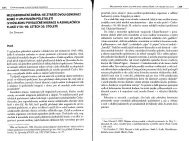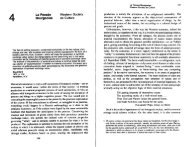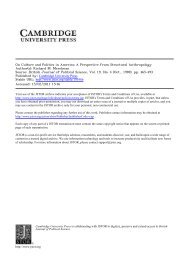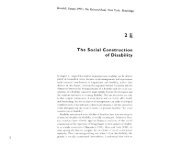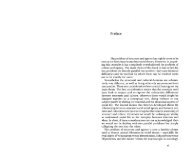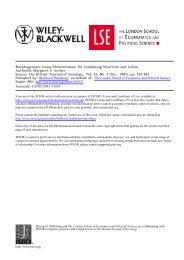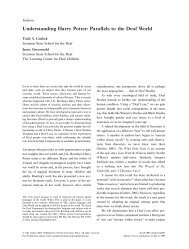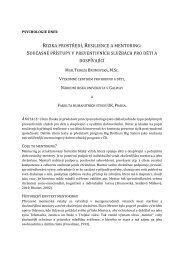Culture and Practical Reason Two Paradigms of ... - Moodle
Culture and Practical Reason Two Paradigms of ... - Moodle
Culture and Practical Reason Two Paradigms of ... - Moodle
- No tags were found...
You also want an ePaper? Increase the reach of your titles
YUMPU automatically turns print PDFs into web optimized ePapers that Google loves.
Chapter <strong>Two</strong> 92 <strong>Culture</strong> <strong>and</strong> <strong>Practical</strong> <strong>Reason</strong><strong>Two</strong> Paradigm.s <strong>of</strong> Anthropological Theory93got to this point <strong>of</strong> methodological self-awareness. For the central argument<strong>of</strong> Murdock's Social Structure (1949) had already repeated in allessentials the Morganian underst<strong>and</strong>ing <strong>of</strong> the relationships between practicalcircumstance, utilitarian action, <strong>and</strong> cultural order. Murdock might bethe first to take issue with Morgan on matters <strong>of</strong> methodology <strong>and</strong> details <strong>of</strong>interpretation, but his comprehension <strong>of</strong> social structure is in the direct line<strong>of</strong> praxis theory. For Murdock, the formation <strong>of</strong> "consanguineal kingroups"-<strong>and</strong> by consequence the classification <strong>of</strong> kinsmen-amounts tothe recognition <strong>of</strong> de facto arrangements on the ground, that is, <strong>of</strong> therelationships precipitated by residential practices, which in tum respond topractical exigencies. Residential practice is thus the dynamic key. Determiningthe actual composition <strong>of</strong> social groupings, it plays a role in Murdock'sscheme analogous to that played by exogamous unions in the firststages <strong>of</strong> Morgan's: the medium by which objective or natural constraint isreified in cultural form. Kinship relations are constituted by reflexiveawareness <strong>of</strong> the group composition thus established. They are the articulateexpressions <strong>of</strong> residential arrangements, <strong>and</strong> residential arrangementsin tum reflect the "fundamental life conditions":The conditions <strong>of</strong> existence <strong>of</strong> any society are always undergoingchange-sometimes rapidly, sometimes slowly-in consequence <strong>of</strong>natural events such as famines <strong>and</strong> epidemics, <strong>of</strong> social events such aswars <strong>and</strong> revolutions, <strong>of</strong> biological influences such as increasing populationdensity, <strong>of</strong> internal adaptations such as technological inventions,<strong>and</strong> <strong>of</strong> external contacts which may stimulate cultural borrowing.Many changes in fundamental life conditions may exert pressure in thedirection <strong>of</strong> modifying the existing rule <strong>of</strong> residence. So diverse arethe causal factors in social change, <strong>and</strong> so few are the alternatives inresidence rules, that nearly any society, whatever its level <strong>of</strong> culture<strong>and</strong> existing forms <strong>of</strong> social organization, can probably encounter particularconcatenations <strong>of</strong> circumstances that will favor the development<strong>of</strong> anyone <strong>of</strong> the alternative rules <strong>of</strong> residence. [Murdock 1949, p.203]So, for example,Patrilocal residence seems to be promoted by any change in cultureor the conditions <strong>of</strong> life which significantly enhances the status,importance, <strong>and</strong> influence <strong>of</strong> men in relation to the opposite sex. Particularlyinfluential is any modification in the basic economy wherebymasculine activities in the sex division <strong>of</strong> labor come to yield the principalmeans <strong>of</strong> subsistence. [Ibid., p. 206]Such residential practices generate specific alignments <strong>of</strong> kinsmen,28 the"recognition" <strong>of</strong> which-recognition which may be withheld-establisheskinship groups such as lineages <strong>and</strong> the customary classifications <strong>of</strong>persons:Unilocal residence does not produce lineages or sibs directly. It mereiyfavors the development <strong>of</strong> extended families <strong>and</strong> exogamous demeswith their characteristic unilinear alignment <strong>of</strong> kinsmen, <strong>and</strong> either <strong>of</strong>these may lead to the recognition <strong>of</strong> non-localized kin groups. Whatmatrilocal or patrilocal residence accomplishes is to assemble in spatialproximity to one another a group <strong>of</strong> unilinearly related kinsmen <strong>of</strong>the same sex, together with their spouses. [Ibid., p. 210]Murdock resumes the whole argument in a just-so story <strong>of</strong> the development<strong>of</strong> a patrilocal-patrilineal system out <strong>of</strong> a dual organization <strong>of</strong> matrilinealclans. The example is capital on several accounts, perhaps notleast that Murdock is compelled to couch his explanation as a myth <strong>of</strong>. origin. At the same time, Morgan's own method clearly comes through,not only in general but in the details <strong>of</strong> the growth <strong>of</strong> patriliny out <strong>of</strong>matriliny (although <strong>of</strong> course Murdock does not hold that this was a uni-'versal sequence <strong>of</strong>evolution). As the story goes, some factor appears in thematrilineal setting which "places a premium on patrilocal residence,"such as the introduction <strong>of</strong> cattle (Morgan's own "factor"), slaves, or shellmoney, accompanied by the notion that prestige is enhanced by polygyny(ibid., p. 217). Now one man after another, "as he acquires wealth,"29 isable by the <strong>of</strong>fer <strong>of</strong> bride-price to persuade other men to allow theirdaughters to remove to his own home. And one man after another begins toleave some <strong>of</strong> his property to his own sons, rather than to his sister's sonsas matriliny enjoins. So, "bit by bit," ties with "patrilineal kin" arestrengthened at the expense <strong>of</strong> "matrilineal," until the people finally discoverthey have been speaking patriliny without knowing it:Almost before the population <strong>of</strong> the village realizes that anything particularlysignificant has happened, they discover that the houses on oneside <strong>of</strong> the street are now occupied by patrilineally related males withtheir wives <strong>and</strong> children, <strong>and</strong> that a similar group lives across the way.28. Murdock here gives himself "kinship" as a natural-genealogical fact, in exactly themanner that Schneider has recently exposed <strong>and</strong> criticized (Schneider 1968; 1972).29. Murdock,like Morgan, takes "wealth" as a natural category, in something <strong>of</strong> the sameway as he assumes "kinship" or "patrilineal kin" as a genealogical category.



